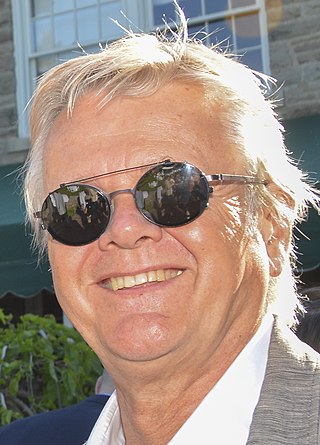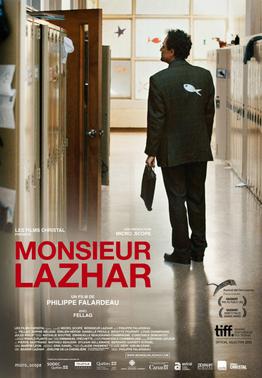Related Research Articles

Madhur Jaffrey CBE is an Indian-born British-American actress, cookbook and travel writer, and television personality. She is recognized for bringing Indian cuisine to the western hemisphere with her debut cookbook, An Invitation to Indian Cooking (1973), which was inducted into the James Beard Foundation’s Cookbook Hall of Fame in 2006. She has written over a dozen cookbooks and appeared on several related television programmes, the most notable of which was Madhur Jaffrey's Indian Cookery, which premiered in the UK in 1982. She was the food consultant at the now-closed Dawat, which was considered by many food critics to be among the best Indian restaurants in New York City.

Don McKellar is a Canadian actor, writer, playwright, and filmmaker. He was part of a loosely-affiliated group of filmmakers to emerge from Toronto known as the Toronto New Wave.
The Top of His Head is a 1989 Canadian comedy-drama film written and directed by Peter Mettler. The film stars starring Stephen Ouimette as Gus, a satellite dish salesman whose life is turned upside down when he meets Lucy, a politically radical performance artist who is on the run from mysterious people pursuing her.
The Canadian Screen Award for Best Achievement in Art Direction/Production Design is awarded by the Academy of Canadian Cinema and Television to the best Canadian film art direction/production design.
The Canadian Screen Award for Best Costume Design is awarded by the Academy of Canadian Cinema and Television to the best Canadian costume designer. It was formerly called the Genie Award for Best Achievement in Costume Design before the Genies were merged into the Canadian Screen Awards.
The Canadian Screen Award for Best Achievement in Sound Mixing is awarded by the Academy of Canadian Cinema and Television to the best work by a sound designer in a Canadian film. Formerly known as Best Overall Sound, it was renamed to Best Sound Mixing at the 9th Canadian Screen Awards in 2021.
The Canadian Screen Award for Best Achievement in Sound Editing is awarded by the Academy of Canadian Cinema and Television to the best sound editor on a Canadian film. The award was first presented in 1970 as part of the Canadian Film Awards, before being transitioned to the new Genie Awards in 1980; since 2013 it has been presented as part of the Canadian Screen Awards.

Sturla Gunnarsson is an Icelandic-Canadian film and television director and producer.
Khaled is a Canadian drama film, directed by Asghar Massombagi and released in 2001. It is the story of a ten-year-old boy who tries to conceal the death of his mother.
Rude is a 1995 Canadian crime film directed by Clement Virgo in his feature-length directorial debut. It was screened in the Un Certain Regard section at the 1995 Cannes Film Festival, before having its Canadian premiere at the 1995 Toronto International Film Festival as the opening film of the Perspectives Canada program.
Lulu is a 1996 Canadian drama film directed by Srinivas Krishna. It was screened in the Un Certain Regard section at the 1996 Cannes Film Festival.

Monsieur Lazhar is a 2011 Canadian French-language drama film directed by Philippe Falardeau and starring Mohamed Saïd Fellag, Sophie Nélisse and Danielle Proulx. Based on Bashir Lazhar, a one-character play by Évelyne de la Chenelière, it tells the story of an Algerian refugee in Montreal who steps in to teach at an elementary school after the former full-time teacher dies by suicide.
Shoemaker is a 1996 Canadian drama film directed by Colleen Murphy. It was written by Jaan Kolk and produced by Elizabeth Yake for Subjective Eye and the Canadian Film Centre.
Eldorado is a French Canadian drama film, released in 1995. Directed by Charles Binamé and written by Binamé and Lorraine Richard in conjunction with its main stars, the film focuses on six young residents of Montreal trying to make sense of their directionless lives.
Two Can Play is a Canadian drama film, directed by Micheline Lanctôt and released in 1993. The film stars Pascale Bussières and Pascale Paroissien as adult sisters meeting for the first time, not having previously known of each other's existence, and intersperses the dramatic storyline with scenes in which the actresses are interviewed about the process of building their characters.
Kumar and Mr. Jones is a Canadian short drama film, directed by Sugith Varughese and released in 1991. The film centres on the relationship between Mr. Jones, a bedridden older man, and Kumar, his Indo-Canadian caretaker whose power in the relationship is threatened when Mr. Jones begins responding favourably to treatment by Melissa, a new physical therapist.
The Climb is a 1986 Canadian-British co-produced adventure drama film, directed by Donald Shebib. A dramatization of mountaineer Hermann Buhl's 1953 attempt to climb Nanga Parbat, the film stars Bruce Greenwood as Buhl alongside James Hurdle, Kenneth Welsh, Ken Pogue, Thomas Hauff, Guy Bannerman, David James Elliott and Tom Butler as members of his expedition.
Narmada: A Valley Rises is a Canadian documentary film, directed by Ali Kazimi and released in 1994. The film documents the activist campaign of Narmada Bachao Andolan against the then-proposed Narmada Dam project in Gujarat, India, including a 200-kilometre protest march by over 6,000 people that followed Gandhi's principles of non-violent resistance.
Soul Cages is a Canadian short drama film, directed by Phillip Barker and released in 1999. Inspired by the old legend of The Soul Cages, in which the souls of drowned sailors are trapped in clay pots at the bottom of the ocean, the film adapts it to the present day by depicting the interactions between a photographer and the clerk processing her film in a one-hour photo lab, around the philosophical question of whether the souls of photographic subjects are trapped in the image.
Srinivas Krishna is an Indo-Canadian film and television director, most noted as the director, writer and lead actor of the 1991 film Masala.
References
- ↑ Suanne Kelman, "Lord Krishna tries on a hockey sweater". Toronto Star , July 7, 1990.
- ↑ "A take-no-prisoners effort: It's a dish that defies simple description". The Province , June 5, 1992.
- ↑ Jay Scott, "Finding solace in tragedy with life-enhancing comedy: First-time directors Srinivas Krishna and Jan Oxenberg have each created a bizarre, very funny film based on bizarre, very unfunny realities". The Globe and Mail , September 14, 1991.
- ↑ Tom McSorley, "Masala". The Canadian Encyclopedia , September 21, 2009.
- ↑ Shlomo Schwartzberg, "'Film-makers of color' resist being pigeon-holed". Financial Post , August 13, 1994.
- ↑ "Masala wins award". Toronto Star , October 5, 1991.
- ↑ "Genies love dark Black Robe; Beresford film leads pack with 10 Genie nominations". Halifax Daily News , October 10, 1991.
- ↑ Pat Mullen, "Oscar Winning Doc Leads List of Restored Canadian Classics". Point of View , May 9, 2023.
- ↑ Etan Vlessing, "Toronto Film Fest Adds Wang Bing, Roberto Minervini, Miguel Gomes Films to Wavelengths". The Hollywood Reporter , August 8, 2024.